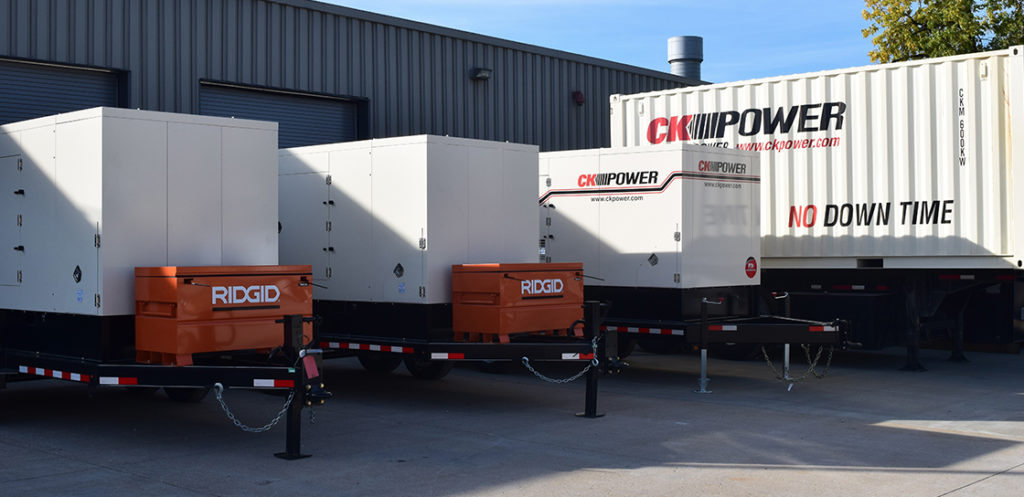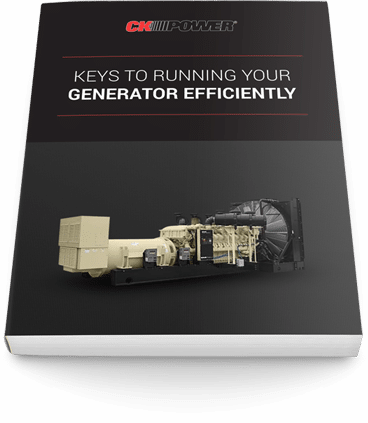The mobile generator you choose for your job site needs to be able to provide the dependable power your job site requires, plain and simple. And because job-site applications vary so widely, mobile generator selection should be taken on a case-by-case basis. A small commercial remodel, for example, will require a much different mobile generator than a big bridge refurbishment or road construction job.
That’s why it’s so important to work closely with your supplier in order to select the mobile generator that best fits your job site’s particular requirements. If needed, some suppliers can even customize a gen set with the necessary load requirements, safety precautions and innovative features you need to be successful day in and day out.

When talking with your supplier, here are eight factors you should consider when choosing a mobile generator fit to power your job site:
1. The amount of power you’ll need from your mobile generator
The mobile generator you choose must have a rated and maximum output high enough to support your job site’s application. Rated output refers to the wattage a generator is able to produce continuously, while maximum output refers to the wattage a generator is able to produce, if only briefly.
To determine the rated and maximum output you’ll require of your mobile generator, you’ll need to determine the combined wattage of all the equipment you’ll be loading onto the gen set. For each piece of equipment, you’ll need to determine both the power required to start the equipment and the power required to run the equipment.
Add the running power for all tools together — the sum is the rated output you’ll require of a mobile generator. Then add the starting power for all your power tools — the sum is the maximum output you’ll require.
Take those numbers and add a 10% buffer as a safety precaution — if you choose a gen set that doesn’t meet the demands of its application, the generator will fail to power your site adequately and wear out faster.
2. Clean power
The Environmental Protection Agency’s (EPA) latest round of regulations on diesel engine emissions — Tier 4 Final regulations — are intended to reduce pollutants harmful to human health and the environment. Diesel generators used as the main source of power for a construction site are governed by these regulations, so you’ll need to look for a manufacturer or supplier with a line of Tier 4 compliant generators.
3. Quietness
Another factor to consider is how loud your mobile generator set is allowed to be. Some commercial and residential areas have strict noise control regulations — and you need to make sure you abide by them.
Industry standard for the sound level on a generator is about 70 dB(A) heard at 23 feet. Most generators meet this standard, but depending on the location or application of your job site, you may require a generator with more sound attenuation (reduction in sound). The more sound attenuation you require, the more your generator set will cost — your supplier can help you determine the level of sound attenuation you need.
4. Diesel vs. gaseous: A question of convenience
Both diesel and gaseous generators are equipped to handle the variable loads required on your job site. Still, due to the abundance of diesel equipment on many job sites, diesel generators make the most sense. With a diesel generator, you can buy fuel for your generator and your other diesel-run tools at the same time — diesel generators are just more convenient for job-site application.
5. Runtime
Runtime refers to the amount of time your generator will run before it needs to be refueled. In general, you’ll want to choose a generator that meets your job site’s load requirements at 100% throughout a typical workday. Anything beyond that is extra. Anything less, and you’re losing precious work time while your crew stands around for the generator to be refueled.
6. Customize your generator with the features your job site needs
Since no two construction sites are the same, customization is key for job-site applications. For contractors in particular, it’s important to determine the features your application requires, and customize a gen set that’s perfect for your job site
Automatic voltage regulators (AVR)
Job sites require variable loads; a surge of power is required as equipment starts and then the power need tapers off as equipment runs normally. An AVR helps ensure the output voltage remains consistent, even under varying loads as you start and turn off your equipment throughout the workday.
AVRs work by storing excess output in a capacitor, which can be released during periods of high demand. This not only protects the generator and prevents brownouts, but also prevents electrical damage to your equipment.
Ground fault circuit interrupter (GFCI) protection
OSHA requires that all job-site power sources come equipped with GFCI protection to prevent electrocution of workers. To this end, it’s important to either choose a mobile generator with built-in GFCI receptacles or to attach an outside device called a spider box with GFCI receptacles.
Automatic idle control
This is a great feature to have no matter your application, and a must for colder job-site applications. Automatic idle control works much like a car — the engine runs at a lower rate when not in use. This lowers fuel consumption and noise levels when there’s no draw, and allows the motor to remain warm before dropping large loads on it — making it especially useful during colder months.
7. Trailer
When it comes to choosing a trailer for your mobile generator, durability and size should be your main concerns. The more substantial the trailer, the lower the risk of your generator becoming damaged on your job site. Strong, galvanized steel trailers are a safe bet for surviving the tough environment of a construction site.
With mobile gen sets, you also need to consider the size trailer you need — do you need extended run fuel tanks on the trailer, or do you require space on the trailer for different pieces of equipment?
The type of trailer you’ll require will depend largely on its intended application. You should work with a supplier that can customize a generator with the features and trailer you need. If, for example, you’ll be using the gen set on a road construction site, you’ll need to work with the supplier to ensure the frame is DOT-certified, has transportation tie-downs, safety chains and reflective DOT tape.
There’s a lot to consider when choosing a mobile generator trailer, but the supplier should be able to point you toward the best choice for your application.
8. An ongoing maintenance plan
On the job site, unexpected downtime isn’t an option. And the key to preventing downtime is a well-thought-out generator maintenance plan.
At regular service intervals — the length of which will depend on the generator you choose–you need to have an experienced generator service provider monitor radiator airflow, engine cooling and filtration systems and fuel storage condition and fittings, among other components.
For convenience, you should consider a supplier that does more than just sell or rent you a generator, but who employs highly trained and certified technicians to plan and execute your maintenance plan and make sure your mobile generator kicks on when you need it.
Your crew works hard — and your generator should too. To prevent downtime and maximize the value of your mobile generator, you need to choose your gen set — and your supplier — very carefully. Using these guidelines, and the assistance of your supplier, you should be able to select or customize a generator set perfect for your particular job site.
